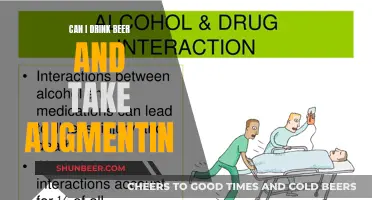
Alcohol consumption is associated with a higher risk of hypoglycemia or low blood sugar. The liver, which is responsible for maintaining blood sugar levels, also detoxes the body of alcohol. When a person consumes alcohol, the liver may neglect blood sugar level maintenance in favour of breaking down alcohol, leading to hypoglycemia. People with diabetes need to be especially cautious as alcohol can worsen complications and interact with medications. Alcoholic drinks like beer are also high in carbohydrates, which can raise blood sugar levels. However, moderate drinking (no more than one to two drinks a day) may have some health benefits, and it is not necessary for people with diabetes to abstain from alcohol completely.
| Characteristics | Values |
|---|---|
| Alcohol consumption for people with hypoglycemia | Doctors associate alcohol consumption with a higher risk of hypoglycemia or low blood sugar. Alcohol inhibits the liver's ability to regulate glucose levels. |
| Alcohol consumption for people with diabetes | Alcohol can cause hypoglycemia or "insulin shock" in people with diabetes. Alcohol interacts with diabetes medications. |
| Preventing hypoglycemia while drinking | Do not drink on an empty stomach. Eat a meal or snack containing carbohydrates before drinking alcohol. Drink slowly. |
| Alcohol consumption recommendations | No more than one drink a day for women and up to two drinks per day for men. |
What You'll Learn

Alcohol inhibits the liver's ability to regulate blood sugar
When you drink alcohol, the liver has to work to remove it from the blood. While the liver is processing alcohol, it stops releasing glucose. This means that your blood sugar level can drop quickly, putting you at risk of low blood sugar or hypoglycaemia. This risk is especially significant for people who take insulin or medications that increase insulin production, as insulin lowers blood sugar levels. If the liver is producing less glucose, medications that increase the amount of insulin in the body may cause blood sugar levels to go too low.
The risk of low blood sugar remains for hours after drinking, and the more drinks consumed, the higher the risk. This is why it is important to drink alcohol with food and only in moderation. Alcohol also has a lot of calories, which can lead to weight gain, making it harder to manage diabetes. Additionally, calories from alcohol are stored in the liver as fat, and liver fat makes liver cells more insulin resistant, which can make blood sugar levels higher over time.
Post-Massage Beer: Is It Safe to Drink Alcohol?
You may want to see also

Alcohol can interact with diabetes medications
Combining the blood-sugar-lowering effects of the medication with alcohol can lead to hypoglycemia or "insulin shock", which is a medical emergency. The liver is responsible for detoxifying the body of alcohol, and when it is busy breaking down alcohol, it prioritises this, and may not release sufficient glucose to keep blood sugar levels high. This is especially significant for people who take insulin or medications that increase insulin production. When the liver is producing less glucose, medications that increase the amount of insulin in the body may cause blood sugar levels to go too low.
If you are taking metformin, doctors advise that drinking alcohol does not support diabetes management and is not safe. Metformin and alcohol both put stress on the liver, intensifying the harmful effects of both and increasing the risk of liver complications. Metformin is a popular, effective, and inexpensive management medication that doctors prescribe for the treatment of type 2 diabetes. It works by improving insulin sensitivity, promoting the uptake of glucose into tissues, and reducing sugar levels in the bloodstream. By increasing the effectiveness of the glucose already circulating in the body, metformin reduces the amount of glucose the liver produces and that the intestines absorb.
When a person drinks alcohol, it also has significant effects on blood sugar. The liver removes poisons from the body and undergoes stress when it has to digest alcohol. When the liver has to process a lot of alcohol, it becomes tired and so releases less glucose. Long-term alcohol use can also make cells less sensitive to insulin. This means that they absorb less glucose from the blood, and levels in the bloodstream increase. Over time, alcohol consumption damages the liver, especially when a person drinks to excess. It reduces the liver's ability to produce and regulate glucose.
The combination of alcohol and metformin can also make abdominal pain worse. Gastrointestinal complications are the most common side effects of metformin. Many side effects of metformin are the same as those of alcohol, so mixing the two can intensify symptoms. The more alcohol a person consumes, and the faster they ingest it, the greater the risk of interactions becomes.
Exploring the Limits: 50 IPAs, a Safe Challenge?
You may want to see also

Drinking alcohol on an empty stomach increases the risk of hypoglycaemia
Drinking alcohol on an empty stomach is not advisable, especially for people with diabetes. Alcohol inhibits the liver's ability to regulate glucose levels, and drinking on an empty stomach increases the rate at which alcohol travels throughout the body. This means that drinking without eating food at the same time greatly increases the risk of hypoglycaemia.
The liver is responsible for detoxifying the body of alcohol. When the liver is busy breaking down alcohol, it prioritises this over releasing glycogen, the stored form of glucose, into the bloodstream. This means that when you drink alcohol, your liver stops releasing glucose. As a result, your blood sugar level can drop quickly, putting you at risk of hypoglycaemia.
Food slows down the rate at which alcohol is absorbed into the bloodstream. When there is food in your stomach before drinking, alcohol is absorbed more slowly. Eating before drinking alcohol slows down the effects of alcohol and reduces your chances of a bad reaction to alcohol.
If you have diabetes, it is important to be particularly cautious when it comes to drinking alcohol. Alcohol can make some of the complications of diabetes worse. It can also interact with diabetes medications, putting you at risk for low blood sugar or high blood sugar (hyperglycaemia), depending on how much you drink and what medication you take.
If you choose to drink alcohol, it is important to take steps to keep yourself safe. This includes drinking alcohol with a meal or a carbohydrate-rich snack, never skipping meals, drinking slowly, and carrying a source of sugar, such as glucose tablets, in case of low blood sugar. It is also important to monitor your blood sugar levels before, during, and after drinking alcohol.
Drinking Beer While Driving in Victoria: What's Allowed?
You may want to see also

Alcoholic drinks are high in carbohydrates and calories
The liver's main function is to store glycogen, the stored form of glucose, so that the body has a source of glucose when it hasn't eaten. When you drink alcohol, the liver has to work to remove it from the blood instead of working to regulate blood sugar. For this reason, you should never drink alcohol when your blood glucose is already low. Food slows down the rate at which alcohol is absorbed into the bloodstream. It is important to eat a meal or snack containing carbohydrates if you are going to drink alcohol.
The liver metabolizes alcohol at a constant rate of approximately one drink per hour. If there is excessive alcohol in the blood, the liver cannot speed up the detoxification process. The unmetabolized alcohol continues to circulate in the bloodstream, leading to intoxication. The liver metabolizes alcohol before its other functions. This disruption in blood sugar levels can cause hunger, nausea, and hangovers, which are all caused by a drop in blood sugar levels.
Sugars and juices mixed with alcohol also speed up the absorption rate. Carbonated alcoholic drinks increase the rate of alcohol absorption because the pressure inside the stomach and small intestine forces the alcohol to be absorbed more quickly into the bloodstream.
The Art of Distilling: Brewing Beer, Simplified
You may want to see also

Alcohol can cause hypoglycaemia for up to 24 hours after drinking
The liver plays a crucial role in maintaining blood sugar levels by storing and releasing glucose as needed. However, when alcohol is consumed, the liver prioritises breaking down alcohol over maintaining blood sugar levels. This means that the liver may not release enough glucose into the bloodstream, leading to hypoglycaemia.
The risk of hypoglycaemia is particularly high for people with diabetes, as alcohol can interfere with diabetes medications such as insulin and sulfonylureas, which also lower blood sugar levels. Additionally, alcoholic drinks are often high in carbohydrates and calories, which can further impact blood sugar levels.
To minimise the risk of hypoglycaemia, it is important to drink in moderation, avoid drinking on an empty stomach, and monitor blood sugar levels before, during, and after drinking. It is also important to be aware of the symptoms of hypoglycaemia, such as dizziness and confusion, as they can be similar to the symptoms of intoxication.
Overall, while it may be safe for some people to drink alcohol in moderation, it is important to be aware of the risks of hypoglycaemia, especially for those with diabetes or other health conditions.
Understanding Beer Flash Coolers: Science Behind the Froth
You may want to see also







